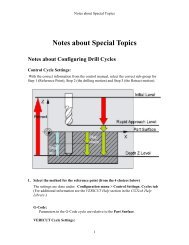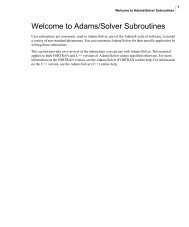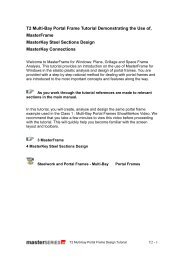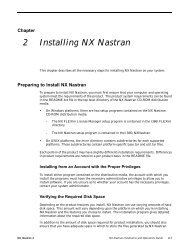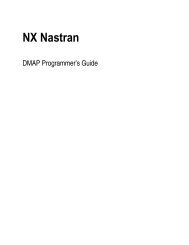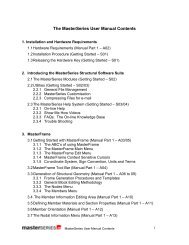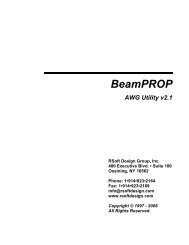You also want an ePaper? Increase the reach of your titles
YUMPU automatically turns print PDFs into web optimized ePapers that Google loves.
<strong>ICAM</strong> <strong>Virtual</strong> <strong>Machine</strong> ® <strong>Virtual</strong> <strong>Machine</strong> Reference, Model Customization<br />
The Macro Language, Fundamentals of the Macro Language<br />
� An expression with sequence data type consists of an ordered set of data elements. The<br />
data elements within a sequence can be of any type, and do not all have to be the same<br />
data type.<br />
The macro language does not require strong data typing. This means that the same variable can<br />
hold information of different types during the course of processing. This provides a great deal of<br />
flexibility and simplifies coding. For those who prefer a more formal arrangement, the DECLAR<br />
command can be used to strongly type variables.<br />
Macro Variables<br />
There are five types of variables: user variables, predefined global variables, predefined local<br />
variables, $P arguments and macro system variables. The following table describes the format of<br />
the various types of variables:<br />
Variable Type Variable Format Examples<br />
User A...Z~[A...Z 0...9_ ] I,ABC2,M4_J<br />
Predefined Global %Gnn %G2,%G02,%G23<br />
Predefined Local %Lnn %L2,%L02,%L23<br />
$P Argument $Pnn $P2,$P02,$P23<br />
System $name $XC,$PI,$T<br />
User variables must always start with an alphabetic character. The remaining characters can be<br />
any combination of letters, digits and the underscore character. The maximum size of a user<br />
variable is 32 characters.<br />
Global variables retain their value across all macros; local variables only retain their value while<br />
a macro is running and are forgotten once it is finished. Global values can therefore be used (and<br />
in fact are the only way) to pass information from one macro to another, whereas local variables<br />
are used for calculations local to a specific macro. By default, user variables are local unless a<br />
DECLAR command is given in the machine startup macro declaring the variable as global.<br />
For predefined local variables, predefined global variables and $P arguments, the leading zero of<br />
the variable number is optional (in other words, %G02 is same as %G2, %L02 is same as %L2,<br />
and $P02 is same as $P2). Predefined global variables (%G00…%G99) do not need a DECLAR<br />
statement since they are predefined as global. The same is true for predefined local variables<br />
(%L01…%L99).<br />
There is a predefined set of macro system variables. Some variables cannot be assigned values,<br />
and most that can be assigned can take only numeric values. See “Simulation Macro Variables”<br />
on page 205 for a list of available macro system variables.<br />
126 <strong>ICAM</strong> Technologies Corporation – Proprietary



